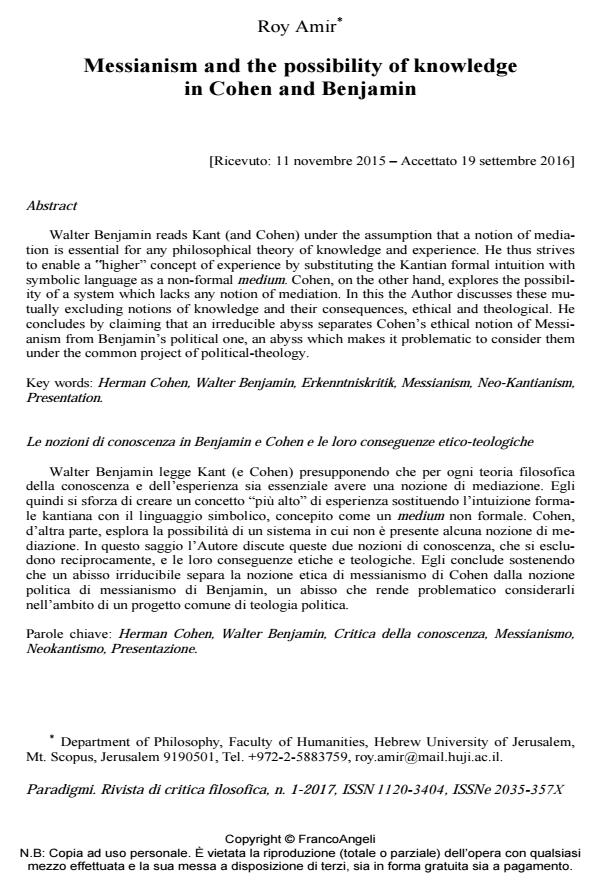Messianism and the possibility of knowledge in Cohen and Benjamin
Journal title PARADIGMI
Author/s Roy Amir
Publishing Year 2017 Issue 2017/1
Language English Pages 18 P. 61-78 File size 266 KB
DOI 10.3280/PARA2017-001005
DOI is like a bar code for intellectual property: to have more infomation
click here
Below, you can see the article first page
If you want to buy this article in PDF format, you can do it, following the instructions to buy download credits

FrancoAngeli is member of Publishers International Linking Association, Inc (PILA), a not-for-profit association which run the CrossRef service enabling links to and from online scholarly content.
Walter Benjamin reads Kant (and Cohen) under the assumption that a notion of mediation is essential for any philosophical theory of knowledge and experience. He thus strives to enable a ?higher" concept of experience by substituting the Kantian formal intuition with symbolic language as a non-formal medium. Cohen, on the other hand, explores the possibility of a system which lacks any notion of mediation. In this the Author discusses these mutually excluding notions of knowledge and their consequences, ethical and theological. He concludes by claiming that an irreducible abyss separates Cohen’s ethical notion of Messianism from Benjamin’s political one, an abyss which makes it problematic to consider them under the common project of political-theology.�
Keywords: Herman Cohen, Walter Benjamin, Erkenntniskritik, Messianism, Neo-Kantianism, Presentation.
- Benjamin W. (1991). Gesammelte Schriften, I-VII, ed. by R. Tiedermann und H. Schweppenhäuser. Frankfurt a. M.: Suhrkamp.
- Cohen H. (1914 [1902]). System der Philosophie, Erster Teil: Logik der reinen Erkenntnis. Berlin: Bruno Cassirer.
- Cohen H. (1907 [1904]). System der Philosophie, Zweiter Teil: Ethik des reinen Willens. Berlin: Bruno Cassirer.
- Cohen H. (1915). Der Begriff der Religion im System der Philosophie. Giessen: Alfred Töpelman.
- Cohen H. (1924 [1915]). Spinoza über Staat und Religion, Judentum und Christentum. In: Strauß B., Hrsg. Herman Cohen: Jüdische Schriften, III. Berlin: C.A. Schwetschke & Sohn: 290-372.
- Cohen H. (1929 [1919]). Religion der Vernunft aus den Quellen des Judentums. Frankfurt a. M.: J. Kauffmann.
- Deuber-Mankowsky A. (2000). Der frühe Walter Benjamin und Hermann Cohen: Jüdische Werte, kritische Philosophie, vergängliche Erfahrung. Berlin: Vorwerk 8.
- Deuber-Mankowsky A. (2005). Hanging over the Abyss: On the Relation between Knowledge and Experience in Hermann Cohen and Walter Benjamin. In: Munk R., ed. Hermann Cohen's Critical Idealism. Dordrecht: Springer: 161-190.
- Fenves P. (2011). The Messianic Reduction: Walter Benjamin and the Shape of Time. Stanford: Stanford University Press.
- Fiorato P. (1993a). Geschichtliche Ewigkeit: Ursprung und Zeitlichkeit in der philosophie Hermann Cohens. Würzburg: Königshausen & Neuman.
- Fiorato P. (1993b). Unendliche Aufgabe und System der Wahrheit. Die Auseinandersetzung des jungen Benjamin mit der Philosophie Hermann Cohens. In: Brandt R. und Orlik F., Hrsg. Philosophisches Denken – Politisches Wirken. Hildesheim: Georg Olms: 163-178.
- Fiorato P. (1994). «Die Gegenwart muß indessen zur Zukunft werden»: Über die “logischen” Grundlagen des Cohenschen Messianismus. In: Orth E.W. und Holzhey H., Hrsg. Neokantianismus: Perspektiven und Probleme. Würzburg: Königshausen & Neuman: 366-378.
- Fiorato P. (2005). Notes on Future and History in Hermann Cohen’s Anti-eschatological Messianism. In: Munk R., ed. Hermann Cohen‘s Critical Idealism. Dordrecht: Springer: 133-160.
- Fiorato P. (2010). Über Walter Benjamins Wideraufnahme der “transzendentalen Methode”. Divinatio, 32: 85-106.
- Fiorato P. (2012). «Zeitlos und dennoch nicht ohne historischen Belang». Über die idealen Zusammenhänge der Geschichte bei dem jungen Benjamin und Hermann Cohen. MLN, 127: 611-624.
- Fiorato P. (2013). «In einer Schwebe zwischen Erkenntnis und Sittlichkeit». Über Hermann Cohens Polyphonie des Systems. In: Wiedebach H., Hrsg. Die Denkfigur des Systems im Ausgang von Franz Rosenzweigs “Stern der Erlösung”. Berlin: Duncker & Humblot: 163-174.
- Friedlander E. (2012). Walter Benjamin: A Philosophical Portrait. Cambridge, MA: Harvard University Press.
- Friedlander E. (2015). Assuming Violence: A Commentary on Walter Benjamin’s “Critique of Violence”. Boundary, 2, 42(4): 159-185.
- Hamacher W. (1991). Afformative, Strike. Cardozo Law Review, 13: 1133-1157.
- Hamacher W. (2012). Intensive Languages. MLN, 127(3): 485-541,
- Holzhey H. (1986). Cohen und Natorp I: Ursprung und Einheit. Basel-Stuttgart: Schwabe.
- Kant I. (1787 [1781]), Kritik der reinen Vernunft. In: Kants Werke. Akademie-Textausgabe (1968-1977), III, IV. Berlin: De Gruyter.
- Ng J. (2012). Kant’s Theory of Experience at the End of the War: Scholem and Benjamin read Cohen. A Commentary. MLN, 127(3): 462-484,
- Poma A. (1988). La filosofia critica di Hermann Cohen. Milano: Mursia (Engl. transl.: The Critical Philosophy of Hermann Cohen. Albany: State University of New-York Press).
- Renz U. (2002). Die Rationalität der Kultur: zur Kulturphilosophie und ihrer transzendentalen Begründung bei Cohen, Natorp und Cassirer. Hamburg: Felix Meiner.
- Rosenzweig F. (1984 [1924]). Einleitung in die Akademieausgabe der Jüdische Schriften Hermann Cohens. In: Mayer R. und A., Hrsg. Zweistromland (Gesammelte Schriften, 3). Dordrecht: Martinus Nijhoff: 177-223.
- Rosenzweig F. (2002). Die “Gritli”-Briefe: Briefe an Margrit Rosenstock-Huessy, hrsg. von I. Rühle and R. Mayer. Tübingen: Bilam.
- Scholem G. (2012). Über Kant. MLN, 127: 440-441,
- Weidner D. (2014). The Political Theology of Ethical Monotheism. In: Rashkover R. and Kavka M., eds. Judaism, Liberalism and Political Theology, Bloomington, IN: Indiana University Press: 178-196.
Roy Amir, Messianism and the possibility of knowledge in Cohen and Benjamin in "PARADIGMI" 1/2017, pp 61-78, DOI: 10.3280/PARA2017-001005